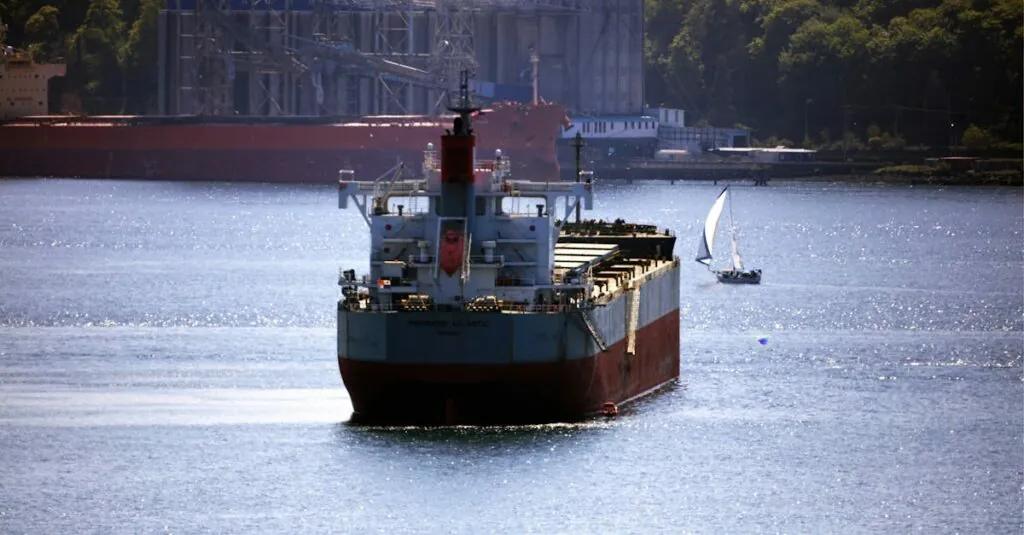Table of Contents
TogglePicture this: the wind in your hair, the salty sea breeze on your face, and endless horizons waiting to be explored. Global marine travel isn’t just a means to get from point A to point B; it’s an adventure that transforms ordinary vacations into extraordinary tales. Whether it’s sailing through the turquoise waters of the Caribbean or navigating the fjords of Norway, every journey offers a unique blend of thrill and tranquility.
As the world shrinks and wanderlust grows, marine travel has become the ultimate escape. With countless destinations and experiences, it’s time to trade in those boring landlocked vacations for a splash of maritime magic. So grab your sunscreen, your sense of adventure, and let’s dive into the fascinating world of global marine travel—where every wave brings a new story and every port holds the promise of discovery.
Overview of Global Marine Travel
Global marine travel encompasses a variety of experiences that redefine vacations. Travelers embark on cruises, sailboats, and luxury yachts to explore different cultures. Each journey presents opportunities for adventure in stunning settings like the Caribbean and the fjords of Norway.
Cruise lines offer itineraries tailored to diverse preferences. Families enjoy kid-friendly activities, while couples may seek romantic getaways in picturesque locations. Unique excursions, such as guided tours, culinary experiences, and wildlife interactions, enhance the overall journey.
The environmental impact of marine travel continues to gain attention. Responsible travel practices emerge, focusing on sustainability and minimizing ecological footprints. Many cruise operators now utilize eco-friendly technologies, improving energy efficiency and reducing waste.
Destinations accessible by marine travel often feature breathtaking landscapes. From tropical islands to rugged coastlines, travelers encounter varying climates and ecosystems. Experiences in marine environments include snorkeling among vibrant coral reefs or exploring historic coastal towns.
Seasonal fluctuations play a crucial role in planning marine travel. The Caribbean thrives during winter months, while the Mediterranean sees an influx of travelers in summer. Researching peak seasons allows travelers to maximize enjoyment while balancing costs.
Marine travel fosters community and connection among passengers. Shared experiences create lasting friendships, with many travelers returning to the sea together. It’s not just a vacation; it’s a chance to build networks, share stories, and explore together.
Popular Destinations for Global Marine Travel
Marine travel offers an array of stunning destinations. Travelers can choose from bustling cities and serene islands, each presenting unique experiences.
Cruise Travel Hotspots
The Caribbean stands out as a premier cruise destination. Visitors enjoy island-hopping between locations like St. Thomas, Cozumel, and Grand Turk. Alaska also captivates travelers with its majestic glaciers and natural beauty, featuring ports like Juneau and Ketchikan. The Mediterranean provides a blend of culture and scenery, drawing passengers to locales such as Santorini and Amalfi. Additionally, the Baltic Sea showcases historic cities like Tallinn and Stockholm, making it an attractive option for many maritime explorers.
Adventure Sailing Locations
Exploring the Whitsunday Islands in Australia excites adventure seekers. This destination offers perfect conditions for sailing and snorkeling around the Great Barrier Reef. The British Virgin Islands are famous for their clear waters, making them ideal for both novice and experienced sailors. In the Greek Islands, crews find stunning vistas and rich history, particularly around islands like Mykonos and Rhodes. Lastly, the Sea of Cortez boasts diverse marine life, ideal for those keen on adventure sailing and wildlife encounters.
The Impact of Technology on Global Marine Travel
Technology significantly shapes global marine travel. Innovations enhance passenger comfort, improve safety protocols, and promote sustainable practices.
Innovations in Ship Design
Innovations in ship design enhance stability and energy efficiency. Modern vessels incorporate advanced materials and hydrodynamic shapes, resulting in faster transit times and reduced fuel consumption. Many ships feature eco-friendly propulsion systems, decreasing their carbon footprint. Spacious decks offer various amenities, from pools to recreational areas, catering to diverse passengers. Additionally, smart technology allows for real-time updates on weather conditions and safety protocols, enhancing the overall travel experience.
Digital Booking Platforms
Digital booking platforms revolutionize how travelers reserve marine journeys. Users can compare prices, read reviews, and explore itineraries from multiple operators with ease. Many platforms provide mobile apps, enabling travelers to book trips on-the-go. Streamlined processes eliminate the need for lengthy phone calls or waiting times, making travel planning efficient. Personalized recommendations based on user preferences enhance the booking experience, ensuring satisfaction. Integration with payment systems simplifies transactions, further encouraging impulsive bookings.
Environmental Considerations in Global Marine Travel
Global marine travel prioritizes sustainability and environmental responsibility. Cruise lines and operators increasingly implement eco-friendly practices to reduce their ecological footprints.
Sustainable Practices in the Industry
Conscientious companies employ innovative technologies to minimize waste and emissions. Advanced waste management systems on ships effectively reduce pollution in marine environments. Many operators utilize energy-efficient designs and renewable energy sources, such as solar panels, to power their vessels. Some destinations promote local partnerships, ensuring that tourism supports nearby communities while preserving natural habitats. These initiatives not only enhance traveler experiences but also protect fragile ecosystems.
The Role of Eco-Tourism
Eco-tourism plays a significant role in global marine travel by fostering environmental awareness. Travelers seeking responsible adventures participate in activities that prioritize sustainability. Guided eco-tours educate passengers on marine conservation and the significance of biodiversity. Destinations that embrace eco-tourism often feature marine wildlife preservation efforts, encouraging visitors to engage with nature responsibly. Collective resources, like local guides and educational programs, enhance the overall experience while raising awareness about environmental stewardship.
Global marine travel offers an unparalleled way to discover the world while enjoying the beauty of the ocean. With diverse experiences ranging from thrilling adventures to serene escapes, travelers can find something that suits their desires. The industry’s commitment to sustainability ensures that future generations can also enjoy these breathtaking destinations.
As technology continues to evolve, marine travel will likely become even more accessible and enjoyable. Whether it’s the allure of the Caribbean or the majestic landscapes of Alaska, each journey creates unforgettable memories. Embracing marine travel means not just exploring new places but also fostering a deeper connection with the environment and cultures encountered along the way.







